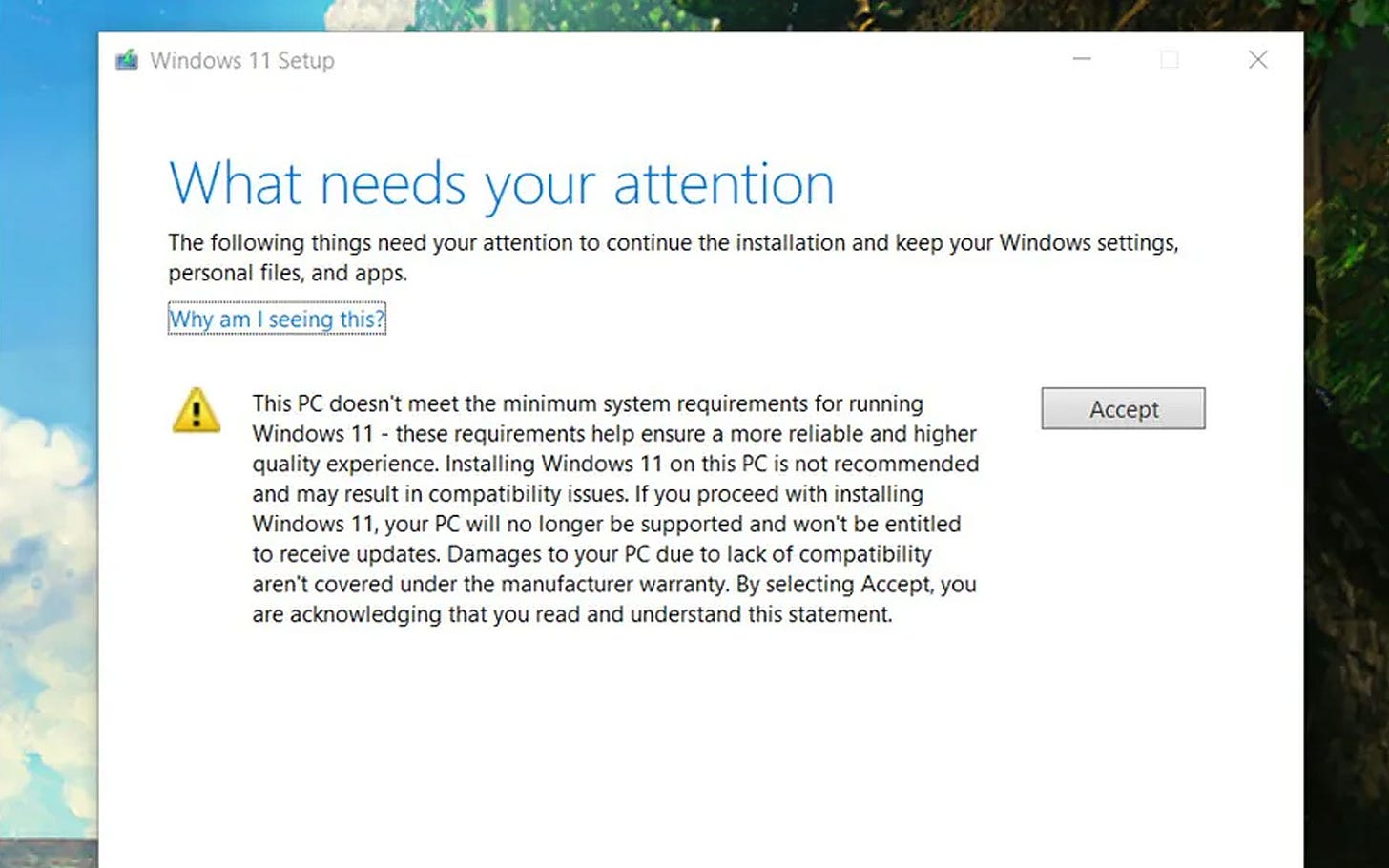The Windows 11 Saga Continues: Now It Will Be Your Fault
Microsoft will not be held responsible for something it should not offer in the first place - wait, what?

Barely a week stands between the world and Windows 11 - Microsoft's new operating system that had a rather bumpy ride ever since it was announced in June - and it's only now that the company deems it necessary to come clean regarding one of the most-discussed issues of the past few months. Microsoft's intentions were expressed as a veiled threat when it finalized the new OS's hardware requirements back in August, but the threat is now a policy as official as it can be: owners of PCs not eligible for the Windows 11 upgrade from Windows 10 - based on those requirements - are not entitled to system updates for the new OS if they go ahead with that upgrade.
When people now get the (essentially final) beta of Windows 11 and try to install it on a non-eligible PC, they are confronted with this message: "This PC doesn't meet the minimum system requirements for running Windows 11 - these requirements help to ensure a more reliable and higher quality experience. Installing Windows 11 on this PC is not recommended and may result in compatibility issues. If you proceed with installing Windows 11, your PC will no longer be supported and won't be entitled to receive updates. Damages to your PC due to lack of compatibility aren't covered under the manufacturer warranty".
The same requester clearly warns users that by selecting "Accept" - the only way they can proceed with the Windows 11 upgrade or installation - they "are acknowledging that they read and understand that statement". In legal speak, this is the equivalent of someone accepting responsibility for any and all outcomes of an action or a choice via a signed agreement. When consumers click on "Accept", that choice is stored on Microsoft servers as proof that they, the company, are in no way responsible for anything that might happen next. Consumers proceeding with the installation are on their own.

So... OK, let me get this straight, Microsoft. Personal computers based on 7th-gen Intel processors (or older) or first-gen Ryzen processors (or older) were good enough to be freely used for telemetry data and code debugging during the necessary beta testing of Windows 11 from June to September by a great many people, but on October 5th onwards they are not good enough to run Windows 11 anymore. Not only that, but they will not be receiving feature or security updates - security being one of the main selling points of Windows 11 - because the very same PCs do not meet those system requirements. Correct?
First of all, congratulations on shamelessly taking advantage of willing consumers for beta testing your upcoming product for months, only letting them know that they actually can't have that product in the way it's meant to be used a few short weeks before launching it. Classy, Microsoft. Classy. Second, if you knew that you'd eventually be imposing these limitations on PCs not eligible for running Windows 11, why allow for its installation on those PCs at all? Was it that hard to do a quick hardware check at the beginning of the whole procedure and inform consumers that their PCs are not meant to run Windows 11 based on its system requirements?
No, it was not. It was not hard. What does seem to be exceptionally hard for Microsoft is being honest towards consumers or, at the very least, open enough even when it's not in its best interests. Whether the Windows 11 pre-launch was botched or not - for a number of different reasons - isn't even up for discussion anymore, but the company still manages to frustrate and disappoint with certain important choices that literally didn't have to be made. It really was in Microsoft's best interest to be completely upfront from the start: "We want to offer the safest, most reliable version of Windows to date. Only PCs that meet these criteria will get Windows 11 for these exact reasons. Everyone else stays on Windows 10. Period".

Yes, there'd still be a lot of protesting and complaining, especially online. Yes, Microsoft would have to explain why and how it came up with that hard line between processor generations. Some hard questions would have probably followed. But at least the Redmond giant would not have been accused of pushing an agenda it cannot justify or of trying to manipulate millions of consumers into buying new computers with a rather unimpressive OS upgrade. Which is more than what can be said now about the whole situation.
What we are all walking into with this Windows 11 launch instead is anyone's guess at this point. Will many consumers risk running a PC with an operating system that gets no updates? What will that mean for the Windows 11 userbase as a whole? Will there be hacks that allow for the updating of unsupported PCs, like there were plenty for non-activated or counterfeit copies of Windows XP back in the day? What will Microsoft's response to those new hacks be? It's all up in the air. For an operating system that is supposed to focus on reliability, stability and security, Windows 11 is already causing a lot of uncertainty to a lot of people. Not exactly a great start, is it?


